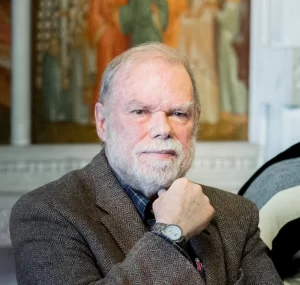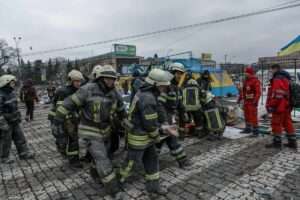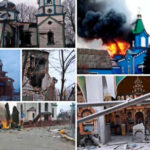Conversations @ E-Mail – October 2011
Counting the Cost. The cost of paradise is the Cross of Christ. God is love. The cost of God loving us is his self-emptying in the incarnation culminating in his passion and total dereliction on the Cross. "My God, my God, why have you forsaken me?" This is the cost of God forgiving us. This is the cost of Christ's total identification with our fallen humanity. In order to win Paradise for us, he has to enter our hell where we are totally bereft not only of God's presence but of life itself. Christ offers us this free gift of forgiveness and salvation without reservation and with only one condition––that we let our hearts be broken open in repentance to receive this forgiveness ("a broken and contrite heart, O God, you will not despise." Ps. 50) and in like manner forgive others. In truly repenting and receiving God's forgiveness, we then forgive others. In a sense it's automatic. We simply can't receive God's forgiveness without forgiving others. "Forgive us our trespasses as we forgive those who trespass against us." The cost of our own repentance and forgiving others is our share in the Cross of Christ. Why is this so rarely even preached? Why do we simply fail to understand this when we evade the simple truth of "Love your enemies"? The answer is very simple, if also very tragic. We don't want to pay the price of God's becoming one of us. We don't want to pay the price of the Cross. Paul del Junco
Paul, your words reminded me of those of Archimandrite Vasileios, Abbot of Stavronikita, then of Iveron, whom I just heard speak. He said: "PARADISE is a kind of TASTING...to know/understand that all is love..." Clearly, this understanding can only come to a heart willing to be broken open and bear the Cross. Ioana Novac
❖
Peace. It seems to me that the majority of Orthodox Saints and fathers hold a simple truth about peace–it must begin with individual peace within and grow from that place. St Seraphim of Sarov is often quoted "If you find inner peace, thousands around you will be saved." Most of the Noble Peace Prize recipients do not reflect that essential element in their acceptance speeches. More often issues of justice and tolerance, or grand multinational policy and international security, are the focus of attention. Is it "peace one person at a time" or can we effect general policies and attitudes? Maybe it can be both. Maybe it is more of how we do it? Fr. John Brian
❖
Fear. Henry Nouwen writes: “Waiting is not a very popular attitude. In fact, most people consider waiting a waste of time. Perhaps this is because the culture in which we live is basically saying, "Get going! Do something! Show you are able to make a difference! Don't just sit there and wait!" For many people, waiting is an awful desert between where they are and where they want to go. And people do not like such a place. They want to get out of it by doing something. In our particular historical situation, waiting is even more difficult because we are so fearful. One of the most pervasive emotions in the atmosphere around us is fear. People are afraid–afraid of inner feelings, afraid of other people, and also afraid of the future. And fearful people have a hard time waiting.
I am fearful of many things–bedbugs, snakes, (9.3 on the Richter scale) earthquakes, offending someone, even of the dark sometimes! I just know God is there and so push myself through those fears. It is a matter of giving them to Him, "putting them on the altar," so to say. It would be impossible for me to make it through a day without exercising faith. So many of those things could and have and do happen! How do I know that the occasional hitchhiker I've picked up is a person of good will? I don't. I come from a family of sometimes violent people who have had problems with post-traumatic stress and alcoholism. The unthinkable does indeed happen. Still, we want to do the needful thing, show hospitality.
On the other hand, reason sometimes cautions that it is time to give certain things up. I think of driving in busy, urban traffic, for example. It is a time of life for me to let someone else sit behind the wheel there, and one day I will probably not drive any longer, period. I just don't respond as quickly as I once did, and I would not want to endanger others.
One of C.S. Lewis' books mentioned that life is more meaningful because death always lurks beside us (I think he actually said "in the water" because he was talking about being beside a pool of some sort). The gist of it was that there is no life without risk of dying or without confronting our fears. This tells us that things matter. Sally Eckert
❖
Related to our "particular historical situation" is the matter of our culture struggling with the matter of having lost its faith (God is dead, etc.) Whether any particular person is devoted or not, we are no longer surrounded by any on-going assumptions and reminders of faith, that we journey on earth for a time before going on to another reality and that what we do here and now is of great significance, etc. Cosmically, therefore, we don't know where we are.
❖
Being lost is scary. This touches the second matter, not limited to this particular time, but–the fear of being alone, truly alone in the universe, as above, but alienated from our selves and therefore alone within ourselves, strangers from ourselves. “They cannot scare me with their empty spacesBetween stars–on stars where no human race is. I have it in me so much nearer home To scare myself with my own desert places.”–from Robert Frost's "Desert Places"
Add to that the lack of community, that we live in such an individualistic society that refuses community. Con-sumer approaches to religious practice indicates this. We don't want to "fit in" to a community at all, with all its implications that fly in the face of me, myself, and I. Our young people have huge trouble with commitment to a partner, leaving marriage till later and later."Kathy, I'm lost," I said, though I knew she was sleeping."I'm empty and aching and I don't know why."–from Simon and Garfunkle's "America"
Why would someone pour out one's heart to someone when he knows she is sleeping? Clearly because he is des-perately afraid, both of being alone and of being known at the same time.Thomas Snowdon I don't have time to do the research but in recent years have several times seen statistics about the number of people in the US using various kinds of stress medication. The number, high already, shot up significantly after 9-11.
I think fear of God is qualitatively different than fear of the threats and dangers that swallow up so much of our physical energy. It would be interesting to look at the Greek words (I am assuming there is more than one) that are translated as “fear.” I think of fear of God as being in a state of radical awe, overwhelmed by the mystery of a Being at once so close and so far, so demanding and so merciful. Jim Forest
❖
Just War. The issue of justifiable war or coercion comes up frequently. I believe I have said this before, but here I must say again that I think the typical Orthodox take on the subject is illogical and unfair to the Catholics.
The argument seems to be that the difference between Orthodoxy and the West on the point of killing is that, if a person ever feels morally compelled to kill one person in order to save another, the killer should still take a repentant attitude. There is no question that Orthodoxy does indeed teach people to take such a repentant attitude and in all seriousness: The Orthodox attitude does indeed appear to be that the action really is to be regretted and the person who committed it needs to search his or her heart deeply, turn away from all low motives that may have led to it (anger, revenge, lust for power, etc.), and acknowledge that the action of killing is always inherently somewhat in-compatible with the Spirit of the Prince of Peace.
My son in the Army told me a story that illustrates the kind of repentance that is called for. When he was serving in Iraq, another young man had engaged with the enemy and killed one of the enemy soldiers. He was very proud of that fact. For about a week he went around saying and implying, "I'm a warrior! I'm a real man!" It was too much for the other soldiers in the unit. His colonel finally said to him, "Soldier, that other young man had a family too." His pride wilted on the spot.
I want to add here that if Orthodoxy does require repentance of a person who kills another person, then Orthodoxy shares the Catholic doctrine of justifiable war, coercion, violence, and killing. I say that because the Catholic tradition of justifiable war has always included the necessity of repentance as one of the criteria for justifiable war. The simple fact is that the Catholics also insist on repentance–so this is not a difference between Catholicism and Orthodoxy. If X is supposed to differ from Y in having Z, but Y does have Z, then X does not differ from Y (at least in that particular respect).
I hasten to add also that the Catholic tradition of justifiable war has been cheapened and prostituted by Western governments and public policy. After all, the theory of justifiable war was used to justify the Crusades. And we have all seen instances of this use of the theory of just war in recent years. It may well be the case that the vast majority of wars do NOT meet the criteria for a just war–but the rulers and leaders of nations use the theory of just war to convince and persuade their people that they should fight. The State has a way of twisting things to its own advantage.
I think that many of the things said against the "theory of just war" have in mind the somewhat less than Christian form that that theory has taken in statecraft in the West–not the theory as worked out by Catholic ethicists and theologians. A recent book explores this aspect of the matter in great and profound detail. I highly recommend Daniel Bell's Just War As Christian Discipleship as a way to explore what the tradition meant and how governments have messed around with it. Another book, much more personal in approach, is Eric Greiten's The Heart and the Fist, which is the story of a humanitarian who came to believe that there is a place for the use of military force in dealing with genocides and other misuses of force. The young man started out doing humanitarian work in Bosnia and Rwanda and ended up becoming a Navy SEAL.
My point here is that when we Orthodox say that we have no theory of a just war, we are indulging ourselves with hype that is not to be taken seriously. It is another example of a kind of Orthodox triumphalism and "The Catholics and the West are always wrong about everything." If you believe that it is ever morally right to use military force to stop military force, then you do in fact have a theory of just war. You then have a moral and intellectual obligation to state under what circumstances it is morally right for nations and individuals to take such action. The Orthodox theory may indeed differ from the Catholic theory in some respects–but I have yet to see an essay that spells out those differences in a way that shows real familiarity with the Catholic tradition. If anyone on the list does know such an essay, please refer me to it; I really would like to see it. I know that we have smart and wise people working on Orthodox ethics–but in this instance, it seems to me that the Catholics have worked harder and articulated a more coherent theory than the Orthodox. We should cultivate the humility to recognize that sometimes our brothers and sisters in other traditions have gifts to give us, and that we have no monopoly on wisdom. David Holden
❖
Whether a tradition has a formal theory of "just war" does not rest on whether its members sometimes consider a certain use of violence to be justified. Many such decisions are taken in an ad hoc, even helter-skelter way, without benefit of careful reflection or doctrinal devel-opment and refinement. Where is the JW Theory in Orthodoxy enunciated? Fundamentally, though, I think this is the bottom line: that a person (or a church) can hold (and I think there is plenty of this in Orthodox tradition) that a) war is never a good in itself and is always lamentable, b) human beings are caught in situations where they cannot always discern a totally moral position–in which case they must do the best they can, and c) we should always repent when we feel we may have committed sin–in fact, we should repent for sins that we have committed without our knowledge or conscious intent If the above looks to anyone like "Just War Theory" then we must agree to disagree. Alex Patico
❖ IN COMMUNION / issue 62 / October 2011









